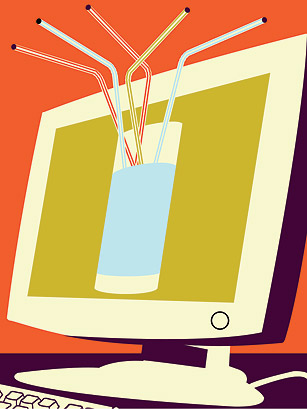
Someday we'll look back on the 20th century and wonder why we owned so much stuff. Not that it wasn't great at first. After thousands of years during which most human beings lived hand to mouth, in the 20th century the industrial economies of the West and eventually much of the rest of the world began churning out consumer goods — refrigerators, cars, TVs, telephones, computers. George W. Bush won re-election as President in 2004 in part by proclaiming an "ownership society": "The more ownership there is in America, the more vitality there is in America."
Even as Bush was announcing its birth though, the ownership society was rotting from the inside out. Its demise began with Napster. The digitalization of music and the ability to share it made owning CDs superfluous. Then Napsterization spread to nearly all other media, and by 2008 the financial architecture that had been built to support all that ownership — the subprime mortgages and the credit-default swaps — had collapsed on top of us. Ownership hadn't made the U.S. vital; it had just about ruined the country.
Maybe we're all learning though. You're not likely to be buying big-ticket items if you're out of work, and even if you have a job and a house, good luck taking out a second mortgage to help you scratch that consumerist itch. That's especially true for the young, who've borne the brunt of the recession, with a jobless rate in the U.S. of about 20%.
And it's the young who are leading the way toward a different form of consumption, a collaborative consumption: renting, lending and even sharing goods instead of buying them. You can see it in the rise of big businesses like Netflix, whose more than 20 million subscribers pay a fee to essentially share DVDs, or Zipcar, which gives more than 500,000 members the chance to share cars part-time.
Those companies, however, while successful, are essentially Internet-era upgrades of old car- and video-rental businesses. The true innovative spirit of collaborative consumption can be found in start-ups like Brooklyn-based SnapGoods, which helps people rent goods via the Internet. Or Airbnb, which allows people to rent their homes to travelers. There's a green element here, of course: sharing and renting more stuff means producing and wasting less stuff, which is good for the planet and even better for one's self-image. And renting a power drill via SnapGoods for the one day you need it is a lot cheaper than buying it. It's a perfect fit for an urban lifestyle in which you have lots of neighbors and little storage.
But the real benefit of collaborative consumption turns out to be social. In an era when families are scattered and we may not know the people down the street, sharing things — even with strangers we've just met online — allows us to make meaningful connections. Peer-to-peer sharing "involves the re-emergence of community," says Rachel Botsman, co-author of What's Mine Is Yours: The Rise of Collaborative Consumption. "This works because people can trust each other."
We yearn to trust and be trusted — one researcher has found that people get a spike of the pleasant neurotransmitter oxytocin when they're entrusted with another's goods. That's the beauty of a sharing society — and perhaps the reason it might prove more lasting than one built on ownership.